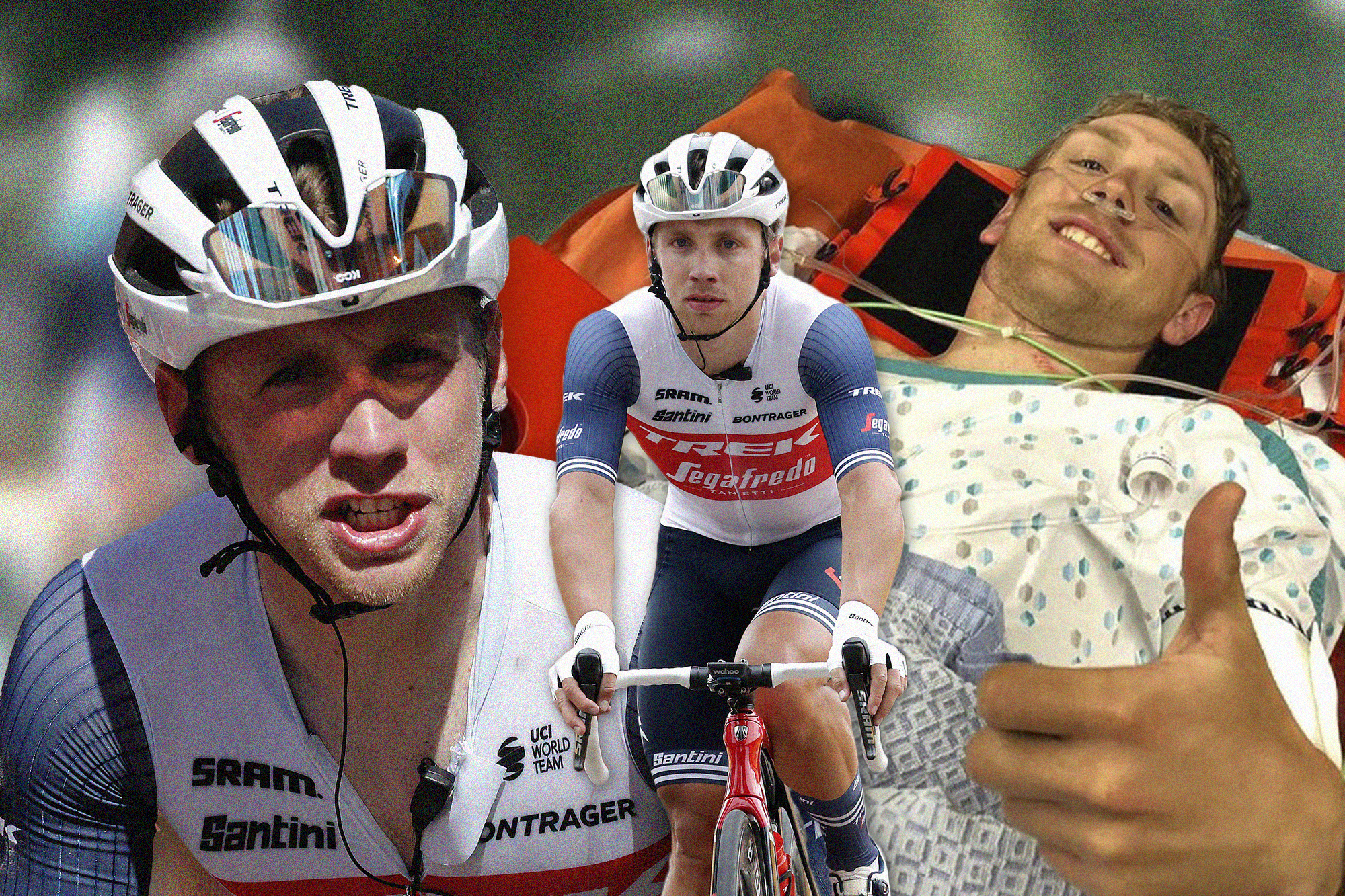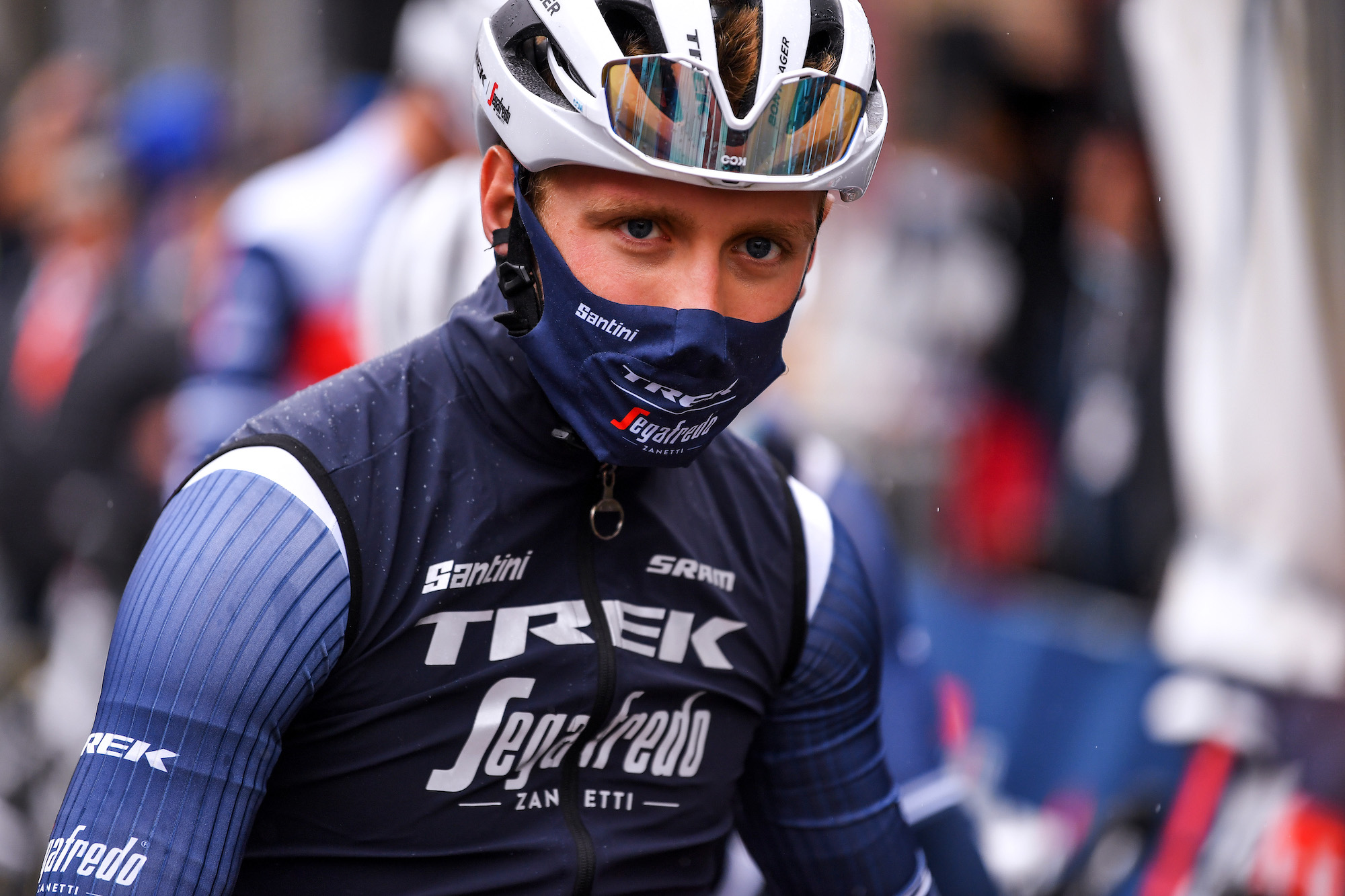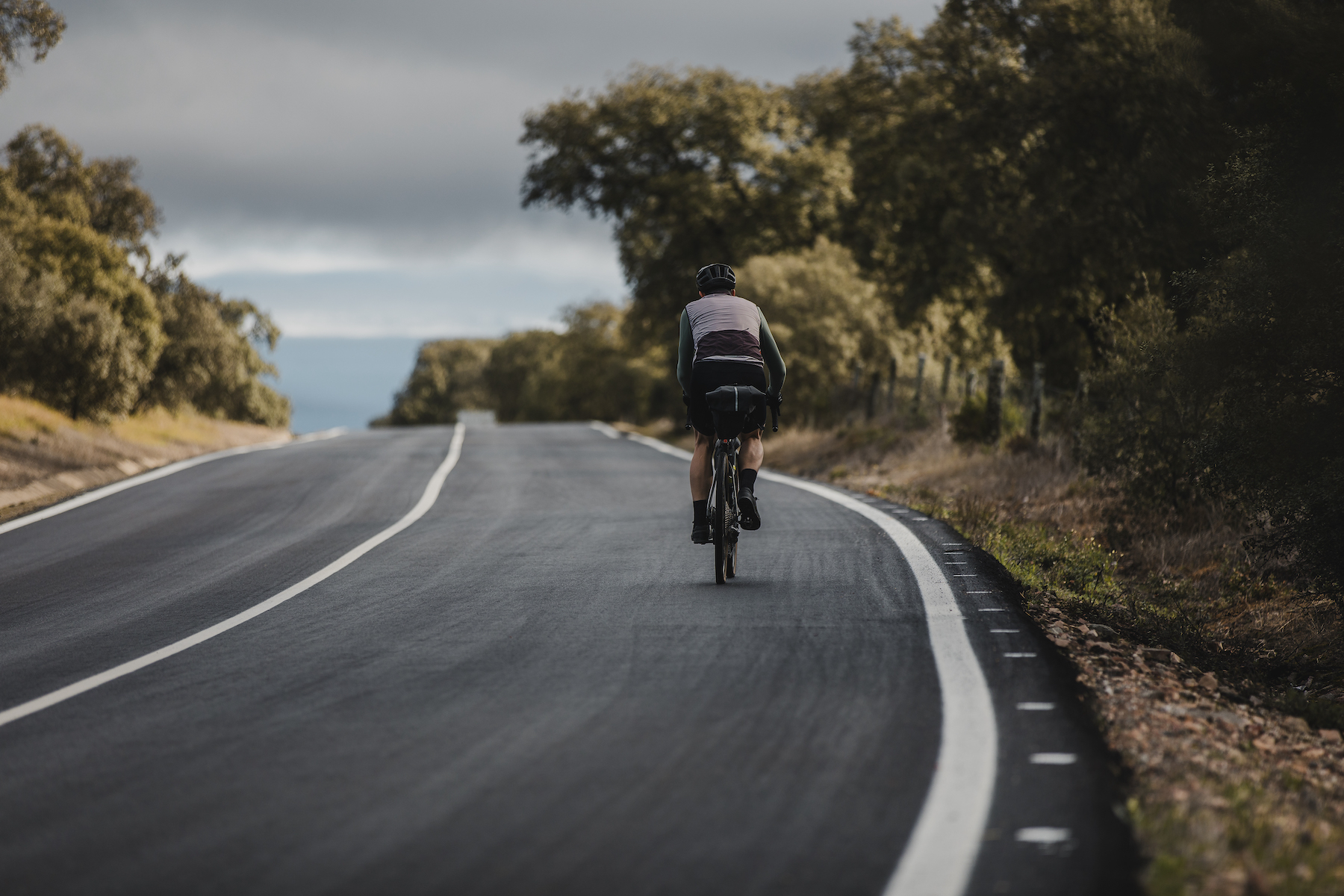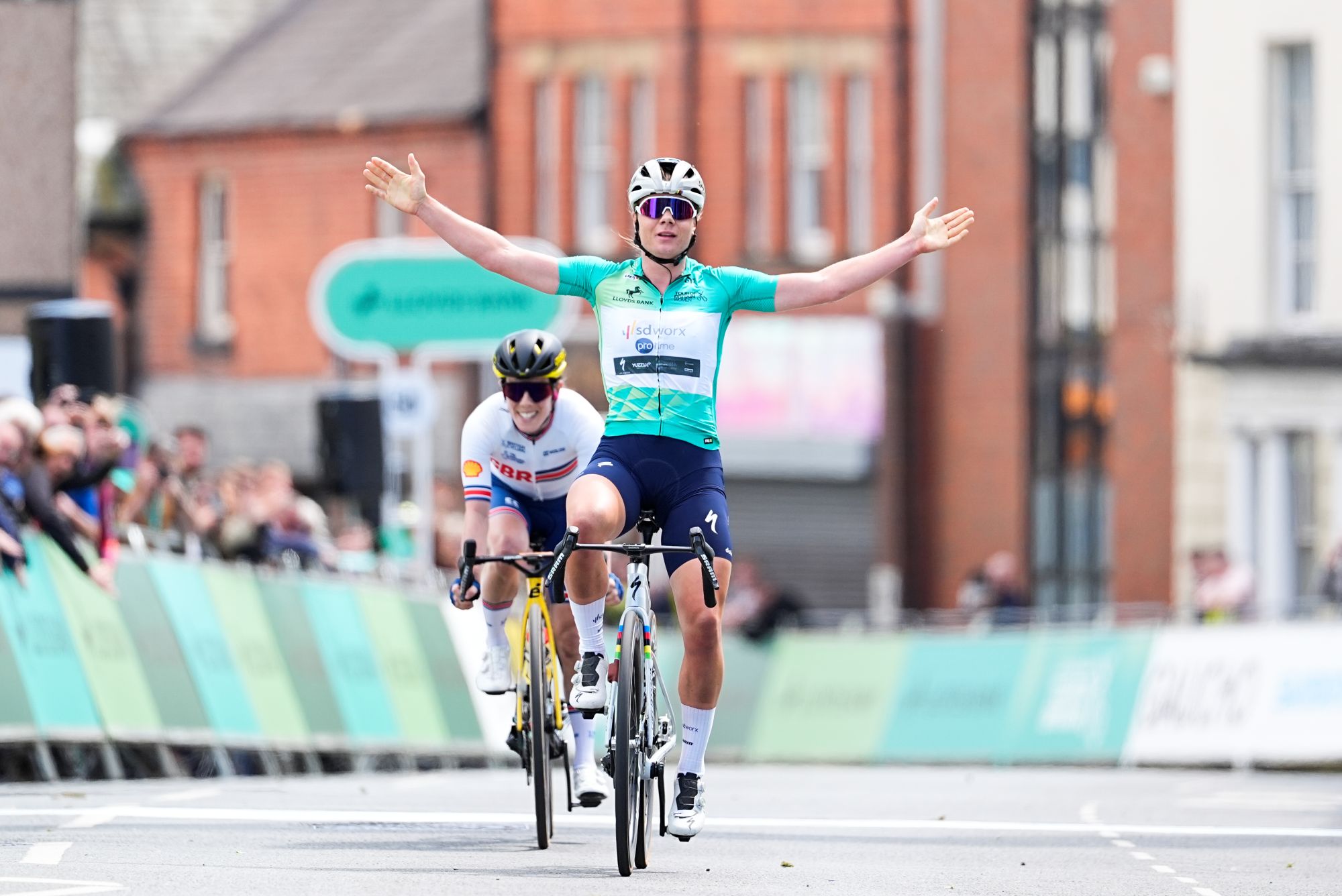Charlie Quarterman: ‘You think it's okay then the next day you'll be crying for no reason when your girlfriend comes home from work’
The 23-year-old was down but is certainly not out and finds himself with ‘a point to prove to the whole world’

“Look, everyone’s told to stay at home unless their journey is essential,” Jeremy Clarkson tells the camera while recording for an episode of Clarkson’s farm. Behind him, a dash of neon yellow and dark blue whizzes past.
“But that doesn’t apply to cyclists, obviously.”
Of course, if Clarkson spent less time flogging potatoes in deepest, darkest Oxfordshire at his farm shop and a little more time paying attention to cycling’s WorldTour, he would have known that cyclist was Charlie Quarterman just doing his job. Out on the roads he grew up on, keeping in shape during the initial coronavirus lockdown a few months into the beginning of his professional career with Trek-Segafredo.
It’s a complete contrast to when he’s in his new home of Annecy, where people he meets out on rides know his name, but due to the general British ambivalence towards road racing that he grew up with, Quarterman isn’t convinced of his WorldTour celebrity status.
>>> 'It's a brutal world': Chasing the dream with James Shaw, who steps back up to the WorldTour
“I think it's because they've seen me as a suggested friend on Facebook,” Quarterman tells Cycling Weekly of his recognisability in France, “rather than me being a professional rider.”
This is a typical response from Quarterman, far from the extroverted top-level British pros we’ve grown used to thanks to the likes of Messrs Wiggins and Cavendish, but what he does share in common is a steely resolve to make it in the sport, epitomised by his quiet, considered tone, which is sometimes a struggle to hear over the phone.
Get The Leadout Newsletter
The latest race content, interviews, features, reviews and expert buying guides, direct to your inbox!
Quarterman now holds the esteemed title of being the latest pro to make it onto the streaming giants like Netflix and Amazon Prime after his cameo in Clarkson’s background, inadvertently following in the footsteps of Movistar and their hit Netflix documentary. “I must admit I didn't care that much actually,” he says before pausing. “It’s something I’m quite proud of,” relenting, “but really, I don’t care that much.”
In fairness there isn’t much room for Quarterman to care about such frivolities, the past two years have been far from easy for the 23-year-old. Having graduated from the Holdsworth-Zappi team that catalyses the journey of many British riders into the pro ranks, his time at the top level has been ambushed by numerous bouts of misfortune. Although, at the outset in 2020, he disagrees with the assertion that the timing of him turning professional on the cusp of a pandemic was another woe to add to the tale.
“It offered stability at that difficult time, I really appreciated that actually,” he says. “Had that happened when I was trying [to turn pro] it might have made it difficult to carry on, especially if I wasn't racing and feeling like I wasn't moving forward…I think I'd be concerned about the possibility of the sports industry looking so bad.
“Knowing that I was already there kind of saved me and got me through a lot of the difficulties, at the same time it was also very difficult, I think it would have been easier if I was already established. I guess last year I missed quite a lot of the time to develop.”
While a lot of people put the step up to the WorldTour just down to numbers and the difficulty of the racing at the top level, it’s more complicated than that, Quarterman argues. The racing is harder and faster, of course, but you also turn up in better condition, having had a massage the day before and with a whole team of people to look after you.
“Finding your place is the hardest thing,” he admits, “there's a lot more in the organisation and the social dynamics in the [WorldTour] teams, and just trying to find out what they want you to do, what they expect, is incredibly hard.”
Quarterman isn’t about to dive head-first into a full-frontal attack on Trek-Segafredo, who chose not to renew his initial two-year contract in the summer, the Brit spending the next few nervy months leaping into action every time his phone buzzed, hoping it was good news from a potential new employer.
“I wouldn’t say it was the fault of the team, really, it was more on my side. You look up to all these riders, arrive at the first training camp, know all the names and you have to find a place for yourself amongst them, which you almost don't allow yourself to do.
“It’d be helpful [for the others] to tell you you're one of the guys. You should be confident enough to bring yourself between them and not be worried about taking the p*ss out of someone. Treating yourself as an equal to them is much easier said than done.”
There’s also very little room for error, as Quarterman found out at the first training camp of 2021. Riding out on the first day without enough clothing, it soon began to rain and the temperature dipped. Of course, he got ill. He admits that this was rightly viewed as an individual error on his part, at a time when the whole team has arrived en masse to begin the season and you want to work hard and show your level.
The cutthroat and self-centred world of being a pro cyclist isn’t something that comes naturally to Quarterman. It’s not a part of his character. At school, he was always in lots of team sports and wasn’t brought up to put himself first like you often have to in the WorldTour. He says this learning curve is very familiar to many of his peers.

“It's something I've kind of come to terms with, but I mean the way you have to treat people in the peloton sometimes, it's easier to not take notice of it,” he says.
“If you decide to change your plan in the middle of the peloton and go to the front, you have to not think about the people around you, they'll deal with it.
“I think it's true,” he says of whether he agrees with James Shaw’s belief that when it comes down to it, cycling is simply a brutal world. “And there are other things that are a part of that, team selection is, unfortunately, one of them where it becomes political and you just play the game.”
At the start of 2021, Quarterman started to feel more at home in higher-level races, not “lost” like in early 2020. But two different knee injuries and a concussion-causing crash at Omloop Het Nieuwsblad made for a “pretty horrific” January and February, which gave him a huge amount to catch up on when he eventually got back to racing in May.
“I should've been scared of it but I wasn't,” Quarterman says of the concussion from the crash. “I probably didn't really accept the situation, or I didn't accept the symptoms I had for a long time. I think what was complicated was I came away in the first three or four weeks with quite heavy mood swings and forgetfulness, it was a whole range of unusual symptoms.
“I thought maybe I'm just a bit p***ed off with Covid and not racing, it's much easier to put it on yourself, find excuses like that, just kind of get on with it and try and deal with it.
“When you think it's okay, you try and convince people that it's fine and then the next day you'll be crying for no reason when your girlfriend comes home from work.”
A searing honesty you only find in people who have exhausted all space for pretence, who have no further patience for what’s been dragging them down.
“The common theme is that every time something [bad] happens I don't really accept it and that kind of makes it worse,” Quarterman says. And there was more bad news still to come.
“Eventually in August I got word that [Trek-Segafredo] weren't [re-]signing me…
“I think the word lost is probably the most appropriate,” for how he was feeling in the aftermath. “You wonder what around you is stable, it becomes very quiet and every day there’s various drips of hope and things. I spent a lot of time waiting next to my phone for notifications on days when I was expecting something, I'd be checking it and it would be like a small emotional roller coaster every time.
“This was going on for a few months now and I think it's something a lot of people won't understand because in the normal world I get the impression it's less brutal and less cutthroat. In the normal world, worst-case scenario you can take a couple of months off and find another job afterwards in something, but for something you’ve dreamed of for a long time, and by the time you get there stopping what you’re doing, not cycling, it puts me in a place where I don’t know what to do.”
It’s a rather bleak view of a calling that is supposed to be so beautiful, something that allows those moored in the normal world a crumb of escapism. Yet increasingly, as more and more riders open up about the realities of life in the peloton, there appears to be a large human cost accumulating.
>>> Does elite cycling have a problem with mental health?
“We get forced to mature quite early, and in the U23 and continental ranks you get put in funny situations, get put under a lot and get told to sort yourself out. I think a lot of people mistake me for being older than I am, partly because of the wrinkles around my eyes, but just the stuff I've kind of been through with cycling, it ages you faster than lots of drinking at uni can do I think.”
Well, that’s some small relief for the rest of us at least.
“I think I've gotten used to this perfectionist way of doing things and dealing with expectations and looking after myself when you find out that everything, even if you're unlucky with things, still becomes your fault, you have to try and avoid possibilities like that. I think it's given me much more of an ability to look at things from all angles and prepare for things and react in the right ways.”
There is a light at the end of the tunnel for Quarterman. And luckily, hopefully, Jeremy Clarkson won’t be standing at the end of it, but instead, another trade team.
“There is one team I'm waiting for in particular and if that comes off it would be a pretty amazing opportunity,” Quarterman reveals, and we should expect specific news on that imminently.
“But thinking about next year, no matter where I am, I know I have quite a big point to prove. Not just from the emotions I have now and my desire to prove wrong the managers that weren't interested or the team that is not re-signing me…
“Actually, it’s going to be my third year, and for me, I've seen a lot of positives from the races I've done that's never been translated into results, so I really feel like I've got a point to prove to the whole world.”

Thank you for reading 20 articles this month* Join now for unlimited access
Enjoy your first month for just £1 / $1 / €1
*Read 5 free articles per month without a subscription

Join now for unlimited access
Try first month for just £1 / $1 / €1
Jonny was Cycling Weekly's Weekend Editor until 2022.
I like writing offbeat features and eating too much bread when working out on the road at bike races.
Before joining Cycling Weekly I worked at The Tab and I've also written for Vice, Time Out, and worked freelance for The Telegraph (I know, but I needed the money at the time so let me live).
I also worked for ITV Cycling between 2011-2018 on their Tour de France and Vuelta a España coverage. Sometimes I'd be helping the producers make the programme and other times I'd be getting the lunches. Just in case you were wondering - Phil Liggett and Paul Sherwen had the same ham sandwich every day, it was great.
-
 'This is the marriage venue, no?': how one rider ran the whole gamut of hallucinations in a single race
'This is the marriage venue, no?': how one rider ran the whole gamut of hallucinations in a single raceKabir Rachure's first RAAM was a crazy experience in more ways than one, he tells Cycling Weekly's Going Long podcast
By James Shrubsall
-
 Full Tour of Britain Women route announced, taking place from North Yorkshire to Glasgow
Full Tour of Britain Women route announced, taking place from North Yorkshire to GlasgowBritish Cycling's Women's WorldTour four-stage race will take place in northern England and Scotland
By Tom Thewlis